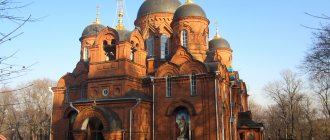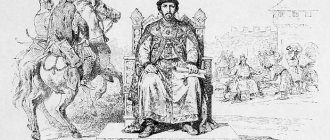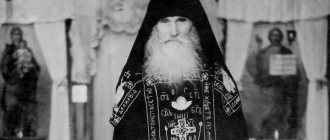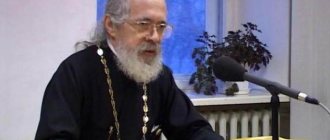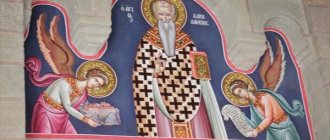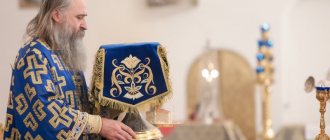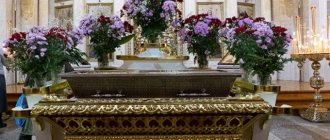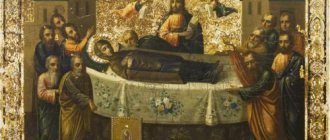Angel Day is popularly called name day. The Guardian Angel is given by God at baptism, it is a ministering spirit, the Patron Angel is a saint, the day of veneration of which is as close as possible to the name of the newborn. There can be several patron saints with the same name; the one closest in date to the person’s birthday is chosen; on other days, small name days can be celebrated.
According to the church calendar, Angel Anatoly Day is celebrated more than ten times a year; almost every month the day of veneration of St. Anatoly is celebrated.
Rev. Anatoly Optinsky (Potapov) (1855–1922)
Father Anatoly, before monastic vows - Alexander Alekseevich Potapov, was born in 1855 into a Moscow merchant family. From an early age, he dreamed of devoting himself to God, but while his mother was alive, she asked him to be with her - and Alexander obeyed. Only at the age of thirty did he enter Optina Pustyn, where he still managed to find the Monk Ambrose (and even serve as his cell attendant). From this great elder he adopted the Optina traditions of clergy.
Quite soon they began to turn to Father Anatoly himself for advice. His authority as a confessor grew steadily, and over time the number of visitors increased so much that even the abbot of the monastery, Archimandrite Xenophon, was not always able to get to him for confession. While accepting a person’s confession, he at the same time fervently prayed for him, and if God revealed to him that some sins remained in the person’s soul, the priest did not read a prayer of permission until he expressed everything. Such care for people resulted in terrible fatigue and illnesses, sometimes very painful, for Father Anatoly himself.
Monks of the Optina monastery harvesting cabbage. Reverend Anatoly is on the far left.
Through the prayers of Father Anatoly, people often recovered, but he always tried to present the matter in such a way that the person did not associate his recovery with him personally. To do this, he sent the sick to a source or to the grave of one of the elders or gave some consecrated thing. One woman told how Father Anatoly gave her a pear for her brother, who, upon her return home, had just become very ill, and after eating the gift, he quickly recovered.
With the coming to power of the Bolsheviks, the prophecies of the Optina elders, the predecessors of Father Anatoly, about the fate of the monastery began to be fulfilled. The monks began to be arrested, sent into exile, mocked... One day the Monk Anatoly (he was already over sixty) was asked to leave Optina. He refused: “Why should I leave the holy monastery at such a time? Everyone will consider me a coward and say: when life was good, he said, “Be patient, God will not leave you,” but when the test came, he was the first to run away.”
During the Civil War, Optina Pustyn, which became an “agricultural artel,” was in great need: there was no bread, and in winter there was not enough firewood. One day, propagandized youth broke out the windows in Father Anatoly’s cell, and the house stood there for the whole winter. It is amazing that during these years the priest retained his presence of mind and encouraged the other monks, although his strength was almost gone.
On August 11, 1922, the Cheka arrived at the former monastery. Elder Anatoly was interrogated and wanted to be taken away immediately, but the priest asked to postpone the arrest for a day in order to prepare for departure. The security officers left, ordering the priest’s cell attendant, Father Varnava, to be ready by morning. The next day they came back: “Are you ready?” “Ready,” the cell attendant answered and opened the door to the room. In the middle of it stood a coffin with a deceased old man.
Two weeks before his death, the priest stood at the grave of the Monk Ambrose and kept repeating: “But here it’s quite possible to lay another one.” This is where he was buried.
Martyr Anatoly of Nicea
The holy martyrs Eustathius, Thespesios and Anatolius were brothers in the flesh and were born in the city of Nicomedia. Their father was called Philotheus, and their mother Eusebius. Philotheus was from Galatia, from the city of Gangra, left his homeland, moved to Nicomedia and, having married Eusebia there, had three sons from her - the three named inhabitants of the heavenly city. At first Philotheus, his wife and children were pagans; He gave his eldest son Eustathius to study pagan wisdom, and prepared Thespesius and Anatoly for trade, since he himself was a merchant and very rich.
But one day, taking his youngest son Anatoly with him, he went to Galatia for shopping and, returning from there, meeting on the way with Saint Lucian, presbyter of Antioch, on the way he learned the Christian faith from him and, together with his son, was baptized in one river that came along the way. Returning home, he began to look for Bishop Anthimus of Nicomedia, who was hiding in one secret place (at that time, during the reign of the emperors Maximian and Diocletian, there was a severe persecution of Christians and many of the believers were hiding from the tormentors) and, having found him, brought him to him at night, after which Saint Anthimus baptized the entire house of Philotheus. Having then performed the Divine Liturgy, he communed the newly baptized Holy Mysteries, ordained Philotheus as a presbyter, and his eldest son Eustathius as a deacon, and left, hiding from pagan persecutors, while Philotheus and his family secretly served the true God and led a pious life.
Soon he and his wife departed to the Lord, leaving three pious young men orphans: Deacon Eustathius, Thespesius, and Anatoly - brothers both in flesh and in spirit, since they unanimously served God, burning in spirit and thriving in virtue. One court dignitary, named Aquilin, once sent his slave to buy some things. The slave knew about these three pious young men that they were merchants and had a wide and rich trade, and went to their shop, which he found open. Having gone inside and not finding anyone, he went up the stairs leading to the third floor of the house and heard the voice of Eustathius, reading the psalms of David. The slave quietly climbed the stairs, silently entered the upper room and here he saw Eustathius, holding a psalter in his hands and reading: “Let all those who serve idols, those who boast about idols, be ashamed. Bow down before Him, all you gods” (Ps. 97:7). In addition, he saw crosses and St. icons. Without saying anything, he immediately returned to his master and told him everything he had seen and heard. Aquilin immediately hurried to Emperor Maximian and reported to him what the slave had said. Soldiers were immediately sent to take Eustathius and his brothers. Having arrived at the place with the slave Aquilin, the soldiers found the shop locked: at this time all the inhabitants of the house were in a meeting and remained completely silent, receiving, on the occasion of Sunday, the Mysteries of Christ. Those sent knocked on the doors and called, but there was no answer.
Saint Eustathius, realizing in spirit that the soldiers were sent to take him and his brothers and lead him to torture, said to the brothers:
- Take courage, brothers, and do not be afraid, - Our Lord is calling us to the crown... This night I saw that we were being led to an unjust trial before Maximian, and someone, black in appearance, was following us crying and sobbing and beating himself in the face, condemning : “Woe is me, I am now being defeated.” A bright young man walked ahead of us, holding three crowns and three books in his hands, and said to me: “Eustathius, deacon of Christ! This is what the Father of mercies and the God of all joy has prepared for you. And so, do not be afraid of the tormentors, just as the saint was not afraid of them. Stephen. Having said this, the young man ascended to heaven, and the black one, weeping, retreated to the west.
Having told about his vision, Eustathius strengthened the brothers in courage, saying:
– We will not deny, beloved, Christ our God before men, lest He also deny us before His Father and before His holy angels (Matthew 10:32).
“Our brother and lord and father,” answered Thespesius and Anatoly, “we are ready to die for our Creator and nothing will turn us away from our love for Him.”
While they were talking in this way, the soldiers, knocking hard on the doors, shouted loudly for them to open it. Finally, Thespesius and Anatoly approached the doors and opened them. The warriors, rushing inside, asked them who else was with them, and then, at the direction of Akilin's slave, they went upstairs. Entering the doors of the prayer room, they saw Eustathius holding the Holy Gospel in his hands. Suddenly straightening it up, he read: “Do not be afraid of those who kill the body, but are not able to kill the soul” (Matthew 10:28).
- The commander of the soldiers shouted to him to put down what he was holding in his hands (he himself did not dare to touch the Holy Gospel, since he was the son of Christian parents). Eustathius pressed St. The Gospel to his chest, kissed it and laid it on the table, and one of the soldiers remarked:
- Look how Christians love their books, which contain all their magic.
The soldiers took Eustathius and led him down. And he, looking around and seeing the sacred books, said, addressing them as if they were alive:
- We promise you!
Then, looking at the many expensive things they were selling, he exclaimed:
– We renounce you and everything corruptible and follow Christ!
Then everyone left. The doors of the house were locked and sealed, and the soldiers tied the three holy brothers together and led them to Emperor Maximian.
Seeing them, the emperor smiled and said:
-Who ordered these young men to be tied up? I am sure that they are friends of our gods.
And he ordered to untie them immediately and asked them:
- First of all, tell me, everyone, what are your names and what family are you from?
“The most dear and glorious name for us is Christians,” Eustathius answered for everyone, “as the eldest; and at birth - I was named Eustathius, my brother, that to the right - Thespesius, and to the left - Anatoly; We are brothers in the flesh, born here of the same father and mother, and our father, originally from Galatia, was a Christian presbyter.
“Who,” asked Maximian, “made your father presbyter?”
“The one,” answered Eustathius, “whom you recently undeservedly subjected to the death penalty: Saint Anthimus, bishop of our city; He also made me a deacon so that I would serve the priests of God during their celebration of the most holy and pure Mysteries of Christ.
Then the king said:
- Stop talking nonsense; Better worship the gods together with our brothers, and I will give you an honorable and glorious position at my court. If not, then I will condemn you to death by the sword.
The saints answered in one voice:
– Do what you want: we are Christians and we worship only God, who created heaven and earth, His Son, our Lord Jesus Christ and the Holy Life-giving Spirit; and we will never bow to your vile and vile idols.
Enraged by this answer, Maximian ordered them to be thrown to the ground and beaten with sticks. After much torture, the saints, as if with their lips alone, exclaimed to God:
- Glory to you, Lord, that we were deemed worthy to accept torment for your holy name.
And Saint Eustathius added:
- “They have oppressed me much from my youth, let Israel say: They have oppressed me much from my youth, but they have not prevailed against me” (Ps. 129:2-3), - help us, God our Savior.
When the saints were beaten to the last degree, Maximian ordered the beatings to stop and said to the martyrs:
- Atheists! How long will you endure such torment? Make a sacrifice to the gods and do not destroy yourself in vain because of faith in some person who was beaten just like you and died a violent death.
“Let it not be that we renounce the Savior Christ,” answered the saints, “of whom we know that He is the true God, although He suffered on the cross for the sake of our salvation.”
Then the tormentor ordered to take them to prison, firmly put their feet in stocks and not give them anything to eat or drink, in order to kill them with chains, hunger, and thirst. And so, when they were sitting in prison, at midnight one day a light shone on them, an Angel of the Lord appeared to them, freed them from their bonds, healed them, fed them with manna and said:
– Fight the good fight for Christ, but I will not leave you and in all your sufferings I will be with you, for I was sent by Christ the Lord to protect you.
Having said this, the Angel became invisible, and the saints, full of unspeakable joy, thanked God, and Eustathius said: “The Lord looses prisoners, the Lord opens the eyes of the blind, the Lord raises up the bowed, the Lord loves the righteous. The Lord protects the strangers” (Ps. 146:7-9).
After some time, Maximian again appeared in court and sent soldiers to the prison to bring the prisoners of Christ for a second time to trial. The soldiers went and found the saints freed from their bonds, completely healthy and sleeping peacefully. They raised a cry, scolded the guard and tried to find out who freed the prisoners from their bonds. The guard assured them with an oath that no one freed them and that no one even entered the prisoners or allowed them to eat or drink. The soldiers again tied up the saints and led them to the king.
The king, seeing them healthy and cheerful, was surprised that neither beatings, nor bonds, nor hunger, nor thirst had any effect on them, and said to them:
- Pathetic people! Consider carefully what is more profitable for you and, once convinced, make a sacrifice to the gods, and I will let you go with honor.
But Saint Eustathius answered:
– Do not hope to change our firm decision either with flattery, or threats, or torment: we are not tied to this life in any way, since we know that just as we came naked from our mother’s womb, so naked will we have to leave this vain life.
The king ordered them to be immediately given to the beasts to be devoured, and they were led to the circus, where the beasts were to devour them, and the whole people of Nicomedia followed them - and among them there were many secret Christians - and everyone wanted to see the death of the martyrs. When they were placed in the middle of the circus, two lions and three bears were released on them, and all the spectators were horrified by the roar of these animals. Saint Eustathius sang psalms.
“Save me from the mouth of the lion,” he sang, “and from the horns of the unicorns, when you hear, [deliver] me. I will proclaim Your name to my brothers, in the midst of the congregation I will praise You” (Ps. 21:22-23) 7570.
Thespesius and Anatoly were afraid of the bestial growl and Eustathius, seeing their fear, said:
- Why, brothers, are you afraid of these animals? Don’t you know that our Lord is able to tame their rage, just as he tamed it in the Den of Daniel? Don't you remember the words of the Angel, who promised to be with us in all our sufferings and protect us?
When Eustathius said this, the lions rushed towards the martyrs, but, approaching them, they stopped and waved their tails, like dogs recognizing their master, and Eustathius put his hands on their heads and, stroking them like dogs, completely tamed them. The bears, clutching each other, threw one another to the ground, and did not even come close to the holy martyrs. The people gathered for the spectacle made a noise, and the pagans shouted: “They are magicians and pacified the beasts with witchcraft!” and the Christians exclaimed: “Great is the Christian God, who blocked the mouths of the beasts so that they could not harm his holy servants!”
Finally, the king ordered the martyrs to be thrown into prison again, and here they were again consoled by the appearance of an Angel and strengthened by manna.
Meanwhile, the king's son Maxentius fell seriously ill, and the king, saddened and concerned about his illness, entrusted the martyrs to the Nicene committee Anthony.
“Take,” he said to the committee, “the Christians to your city and there force them to worship the gods and, if they listen to you, bring them back here with honors; if not, then, after much torment, slaughter them like wild ones.” animals.
Komit took the prisoners and went with them to Nicaea. Arriving home, he found his wife sick. He ordered the martyrs to be locked in prison for the night, and the next morning he ordered them to be brought to him, sat down in the judge’s seat and, turning to them, said:
“I, young men, am very much concerned about your fate, and I would very much like to have mercy on you and send you to the king to receive all sorts of honors from him.” Trust me as your friend, obey me and make sacrifices to the gods.
“We pray,” answered the saints, “to our Lord Jesus Christ, that He will keep us blameless in the faith that He taught us and for which we are ready to die, and that He will not allow us to depart from Him and fall into the destruction in which you are perishing.” .
Komit, hearing this, flew into a rage and ordered them to be hanged by their feet, heads down, and whittled with iron claws. They were tortured in this way for a long time, their blood flowed in streams, their bodies were torn off in pieces, their bones were exposed... Finally, the saints cried out loudly to God:
- King and God of ages! Look down from Thy holy dwelling upon us, Thy unworthy servants, who suffer for Thy holy name!
And invisible help was given to the saints from above to courageously endure such cruel torment.
Seeing the invincible patience of the sufferers, the torturer ordered them to be removed and taken to prison. But the saints could not walk on their own due to their wounds and pain: they were carried and thrown in prison, like some kind of burden. And again, as before, the Angel of the Lord appeared to them, shining with great light, comforted them with joyful hopes and healed them of their wounds. And the saints praised God, saying:
- Glory to You, God, for not abandoning those who trust in You and suffer for Your sake! “What shall I render to the Lord for all His good deeds to me? Who is God as great as [our] God! You are a God who works miracles” (Ps. 116:3; Ps. 76:14–15). Soon the tormentor again brought the holy martyrs out of prison and ordered them to be placed before him. He placed his idols in front of them and forced them to bow to these idols, threatening them for disobedience.
“If you,” he said, “do not fulfill the royal command and do not worship our gods, then I will put you to death by the sword, and I will give your bodies to be devoured by wild beasts and birds.”
But the saints answered with one voice:
“Let us not depart from Christ our God and worship the vile idols, the dumb and deaf, who have eyes and do not see, who have ears but do not hear, who have lips and do not speak, who have feet and do not walk.” Let all who make them and all who worship them be like them.
At these words, the tormentor roared with anger like a lion and ordered the martyrs to be taken out of the city and stabbed with a sword like wild animals, and their bodies to be thrown unburied to be torn to pieces by animals and birds. The saints were led to the place of execution. At this place there was an olive garden, and the martyrs were tied to trees for execution. Two close friends of the saints, Christians Palladius and Akakios, came to this garden. When the executioners wanted to kill the condemned, those who came threw themselves at their feet, gave them a lot of gold and begged them to wait a little while they talked with the condemned, and then begin the execution. Having taken the gold, the executioners moved a little away from the martyrs, and Palladius and Akaki approached them, kissed them with love, wept bitterly and asked them to pray for them. During the dying prayer of the saints, a voice was heard from heaven calling them to eternal rest, and immediately they joyfully gave up their souls into the hands of God. The torturer’s servants, although they saw that the martyrs had already died, however, fearing their master, carried out his command over the dead: they pierced the throats of Eustathius and Thespesius, and pierced Anatoly’s ribs, and then, when the bodies of the dead were already lying on the ground, they cut off their heads and, leaving them unburied, they left. Then six Angels descended from heaven in the form of eagles and hovered over the bodies until Palladius and Acacius buried them with honor.
On the same day, Anthony fell ill at sunset, and the next morning, first his wife died, then he himself, falling on his wife’s body, gave up the ghost in suffering. And so, he suffers in hell, and the holy passion-bearers rejoice in the Kingdom of Christ our God. To him be glory forever and ever. Amen.
- Select and buy an icon of Martyr Anatoly of Nicaea
What saints can you pray to for successful trading?
Entrepreneurs often resort to asking saints to help them improve their business and contribute to its development. It is generally accepted that if during his lifetime a saint was a merchant or ran a farm, then he will certainly show “solidarity” and respond to your request.
From time immemorial, Orthodox Christians have asked the following saints for help in trading:
- Nikolai Ugodnik.
- Spyridon of Trimifuntsky.
- John Sochavsky.
- Seraphim of Sarov.
- John the Merciful.
- Anatoly of Nicea.
- Joseph Volotsky.
- Matrona of Moscow.
- Holy Mother of God.
These saints helped people in need, and for this the Lord elevated them to the ranks of saints. When making a request, you should not think about money, although this is the purpose of trading, it is better to imagine what you plan to buy with it. Your request will be heard and fulfilled if the proceeds are used for good. Also be sure to thank the saints and the Lord for their help.
Believers often resort to strong prayers for trading, because they know that they can:
- attract good luck and promote business prosperity;
- ensure a high and stable influx of customers;
- promote the sale of an unpopular product;
- increase the number of promising transactions;
- protect against the evil intentions of competitors.
It is important to think carefully about the holy texts. Their main idea is that your work will be useful to other people. Put into your words the desire to help customers find high-quality and useful products or services. Of course, you shouldn’t count on instant results, but gradually your business will improve.
Study the biographies of the martyrs and address your request to the one who inspires the highest confidence in you.
